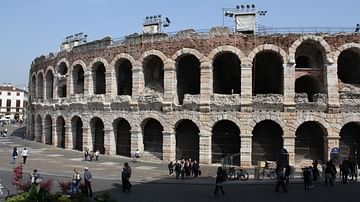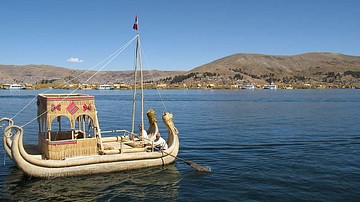Search Definitions
Browse Content (p. 257)

Definition
Segesta
Segesta (or Egesta), located in the north-west corner of Sicily, was an important trading town from the 7th century BCE onwards. Situated on the strategically advantageous slopes of Mt. Barbaro, yet still close enough to the coast to support...

Definition
Horemheb
Horemheb (reigned 1320-1292 BCE) was the last pharaoh of the 18th dynasty of Egypt. He is also known as Dejserkheprure and Horemhab. His name means, “Horus is in Festival” and he came from the lower classes of Egypt, worked himself up through...

Definition
Akhenaten
Akhenaten (r. 1353-1336 BCE) was a pharaoh of 18th Dynasty of the New Kingdom of Egypt. He is also known as 'Akhenaton' or 'Ikhnaton' and also 'Khuenaten', all of which are translated to mean 'successful for' or 'of great use to' the god...

Definition
Nefertiti
Nefertiti (c. 1370 - c. 1336 BCE) was the wife of the pharaoh Akhenaten of the 18th Dynasty of Egypt. Her name means, `the beautiful one has come' and, because of the world-famous bust created by the sculptor Thutmose (discovered in 1912...

Definition
Roman Naval Warfare
Military supremacy of the seas could be a crucial factor in the success of any land campaign, and the Romans well knew that a powerful naval fleet could supply troops and equipment to where they were most needed in as short a time as possible...

Definition
Roman Verona
Verona, situated on the river Adige in northern Italy, was a Roman town probably founded some time in the 2nd century BCE. It was a colonia by 69 CE and the impressive monuments which survive to this day attest to the city's importance. In...

Definition
Urbanization
Urbanization is the process by which rural communities grow to form cities, or urban centers, and, by extension, the growth and expansion of those cities. Urbanization began in ancient Mesopotamia in the Uruk Period (4300-3100 BCE) for reasons...

Definition
The Ancient City
In the study of the ancient world a City is generally defined as a large populated urban center of commerce and administration with a system of laws and, usually, regulated means of sanitation. This is only one definition, however, and the...

Definition
Lake Titicaca
Lake Titicaca is located between Bolivia and Peru and, at an altitude of 3,800 metres (12,500 feet), it is the world's highest navigable lake. The tundra plain known as the altiplano stretches to the south and was the location of Tiwanaku...

Definition
Gold in Antiquity
Gold, chemical symbol Au (from the Latin aurum meaning 'shining dawn'), is a precious metal which has been used since antiquity in the production of jewellery, coinage, sculpture, vessels and as a decoration for buildings, monuments and statues...